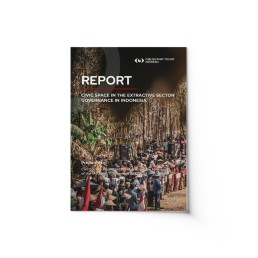In 2021, CIVICUS, a monitoring network of civil liberties, reported that over half of the global population lives in countries where the civic space is restricted, obstructed, repressed, or shut down. In 2017–2022, CIVICUS also categorized Indonesia as a country with an obstructed1 civic space, giving the government a score of 4,6. The “civic space” refers to the access and protection of human rights in civil and political fields. It encompasses the freedom to share and express thoughts, assemble and associate, and access a wide range of information.
This report serves as an advocacy tool for civil society organizations, ensuring that the government can guarantee civil society participation in the extractive sector at both the national and local levels. This is important given the complex obstacles and challenges often encountered by civil society in addressing transparency and accountability issues within this sector. In addition, this report is expected to serve as a learning experience and provide recommendations for stakeholders in the EITI regarding best practices in guaranteeing civic space in Indonesia.
